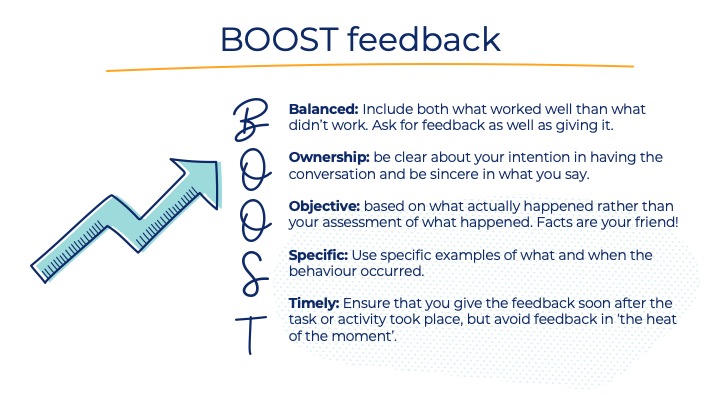Feedback can often feel like a spoonful of cod liver oil – you know it’s meant to be good for you, but we don’t relish it. And it can be hard to hear when you mainly hear about the things that are going wrong. You might wish someone also made time to tell you what’s going right? You’re doing your best after all….
And how often are you giving feedback to others? Research tells us that receiving regular (weekly), useful, feedback is one of the key factors for working at our best. Yet I often find people receive far less than this.
Giving useful feedback is a key responsibility of all managers and an important skill for those of us who work with others. Below I’ve outlined a few principles about what good feedback looks like from research into productivity and staff performance. I hope these are useful whether you’re wanting more useful feedback for yourself or wanting to improve the feedback you offer others.
Let’s focus on useful feedback: rather than ‘negative’ and ‘positive’ feedback
Feedback should be useful and constructive – whether it concerns what is working well or what is not working well. ‘Feedback’ is simply information which enables a system or process to adapt. If ‘feedback’ doesn’t enable learning and improvement then it isn’t feedback – it’s criticism (generalised negative comments) or praise (generalised positive comments). Criticism has no place in the respectful and productive workplace. Praise is less useful than feedback, and arguably also has its downsides.

But we need to get the ratio right: we need to hear five times as much about what works than what doesn’t. Feedback about what works is the fertiliser prepares the ground to receive the tougher-to-hear feedback about problems. So don’t neglect the fertiliser!
Ensure it’s useful
How can you know what feedback is useful? Simply ask – would you value some feedback? What would you like feedback on? What format works best for you – written, a chat after the event etc?
Providing useful feedback takes time: make sure you’re using your time well by focussing on the areas where feedback is most helpful. If someone already knows there’s a problem with X, it’s pointless or maybe even demotivating to be told it again. If they’ve asked for you to look at Y, they are more likely to be receptive to what you have to say about that.
BOOST performance with feedback
There are a few similar models around, but I really like this BOOST model from Andi Roberts (which I’ve slightly adapted) not least as it starts with balanced: reminding us of the ratio in favour of what works. The other aspect of balanced is that we invite feedback as well as offering it. If you’re in a position of power then others might take some encouragement to offer feedback. You can help by avoiding being defensive and showing you’re listening by acting on what you hear.

Ownership is important too – we might avoid speaking directly for fear of offending but being clear is critical. And this cuts both ways – we need to feel feedback is sincere, so that’s going to require us to take time to observe and notice what others are doing well so we can let them know directly.
Providing useful feedback is an essential skill for any manager, and we cover feedback skills and practice on a number of the courses I run in-house for organisations and as open online courses. Get in touch if you’re interested in finding out more about training. And let me know how you get on with the BOOST model.
